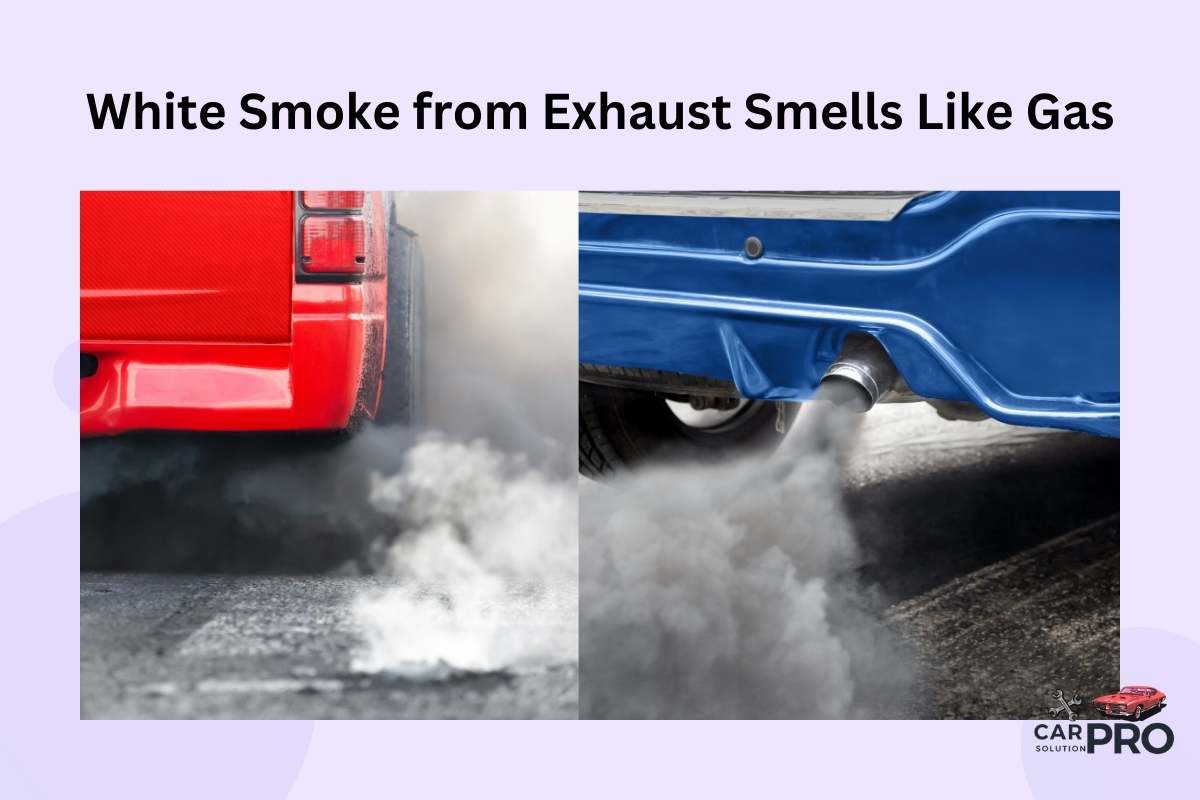White smoke from a car’s exhaust often raises concerns for drivers. When this smoke smells like gas, it can be even more worrying. This issue may point to problems in the engine that need fixing.
White smoke from the exhaust that smells like gas often means unburned fuel is leaking into the engine. This can happen due to issues with the head gasket or other engine parts. It’s important to address this problem quickly to avoid more serious damage.
Drivers who notice this symptom should not ignore it. Getting a quick check-up can save money and prevent bigger issues down the road. Let’s look at why this happens and what steps to take next.
Key Takeaways
- White smoke with a gas smell points to unburned fuel in the engine
- Quick action can prevent more serious and costly damage
- A mechanic can diagnose the exact cause and fix the problem
Understanding Exhaust Smoke
Exhaust smoke color and smell provide key clues about engine health. Different colors and odors point to specific issues that need attention.
Types of Exhaust Smoke
Normal exhaust is usually clear or barely visible. White smoke often means coolant is leaking into the engine. It may have a sweet smell.
Blue smoke suggests oil is burning in the combustion chamber. This can happen due to worn piston rings or valve seals.
Black smoke indicates too much fuel is burning. This could be from a clogged air filter or faulty fuel injectors.
Gray smoke might mean transmission fluid is leaking into the engine. This is serious and needs quick repair.
Indicators of Engine Problems
White smoke that smells like gas often points to a head gasket problem. The gasket may be cracked, letting coolant into the cylinders.
A rotten egg smell means the catalytic converter isn’t working right. It’s not breaking down hydrogen sulfide properly.
The smell of raw fuel suggests the engine is running “rich”. Too much gas is going into the cylinders.
Burning oil smells acrid. This means oil is leaking past worn seals or gaskets into hot engine parts.
A sweet smell usually means coolant is leaking. This can lead to overheating if not fixed soon.
Diagnosing White Smoke
White smoke from your exhaust can point to different issues. The timing and conditions when it appears offer clues about the underlying problem.
White Smoke on Engine Start
When you see white smoke right after starting your engine, it may be normal condensation. This happens more often in cold weather. The smoke should clear up as the engine warms.
If the smoke keeps coming, it could mean coolant is leaking into the engine. This might be due to a cracked head gasket. A faulty head gasket lets coolant mix with fuel in the cylinders.
Check your coolant level. If it’s low, you may have a leak. Look for puddles under your car too.
White Smoke While Driving
White smoke while driving is often more serious. It could mean coolant is getting into the combustion chambers. This can happen if the head gasket is damaged.
Another cause might be a cracked engine block or cylinder head. These are major issues that need quick attention.
If the smoke smells sweet, it’s likely coolant. A gasoline smell points to unburned fuel leaving the exhaust.
Intermittent White Smoke
Sporadic white smoke can be tricky to diagnose. It might only happen when the engine is under stress, like going uphill.
This could indicate a small coolant leak that only shows up under pressure. It might be a tiny crack in the head gasket or engine block.
Keep an eye on your temperature gauge. If it rises when the smoke appears, coolant loss is likely the cause.
Intermittent white smoke can also stem from worn piston rings or valve seals. These let oil seep into the combustion chamber.
Potential Causes of White Smoke
White smoke from the exhaust that smells like gas can be caused by several issues in a vehicle’s engine. The main culprits are often related to coolant or fuel problems.
Condensation in the Exhaust System
White smoke from the exhaust is sometimes just water vapor. This is common when starting a cold engine. The exhaust system heats up and burns off moisture that has collected inside.
It’s normal to see thin white smoke for a short time after starting the car. This smoke should disappear quickly as the engine warms up. If it persists, it may indicate a more serious problem.
In cold weather, condensation can be more noticeable and last longer. The smoke may appear thicker and take more time to clear up.
Coolant Leak
A coolant leak into the combustion chamber is a common cause of white smoke. This often points to a cracked head gasket. The head gasket seals the engine block and cylinder head, keeping coolant out of the combustion chamber.
When coolant leaks into the cylinders, it burns along with the fuel. This creates thick white smoke with a sweet smell. The smoke may get worse as the engine heats up and more coolant leaks in.
Other signs of a coolant leak include:
- Overheating engine
- Low coolant levels
- Bubbles in the radiator or overflow tank
- White residue under the oil cap
Cylinder Head Issues
Problems with the cylinder head can also cause white smoke. A cracked cylinder head allows coolant to enter the combustion chamber. This results in white smoke similar to a blown head gasket.
Warped cylinder heads can cause the same issue. Overheating is a common cause of warped heads. Signs of cylinder head problems include:
- White smoke that increases with engine temperature
- Loss of engine power
- Rough idling
- Decreased fuel efficiency
If left untreated, cylinder head issues can lead to severe engine damage. Prompt diagnosis and repair are crucial to prevent further problems.
Fuel Smell in the Exhaust
A fuel smell from your car’s exhaust often points to problems with the fuel system or engine. This smell can mean unburned gas is getting into the exhaust.
Rich Fuel Mixture
A rich fuel mixture happens when there’s too much fuel and not enough air in the engine. This can make the exhaust smell like gas. Common causes include:
- Faulty oxygen sensors
- Bad mass airflow sensor
- Clogged air filter
- Leaking fuel pressure regulator
These issues can lead to poor fuel economy and increased emissions. A rich mixture may also cause the check engine light to come on.
To fix this, a mechanic needs to test the fuel system and engine sensors. They may need to replace parts or clean certain components.
Fuel Injector Problems
Fuel injectors spray gas into the engine cylinders. When they don’t work right, it can cause a gas smell in the exhaust. Signs of fuel injector issues include:
- Engine misfires
- Rough idling
- Poor acceleration
- Decreased fuel efficiency
Faulty fuel injectors can leak fuel or spray too much. This leads to unburned gas entering the exhaust system.
Fixing injector problems may involve cleaning them or replacing damaged ones. In some cases, the fuel pressure may need adjustment.
Regular maintenance can help prevent these issues. This includes using quality fuel and changing the fuel filter as recommended.
Troubleshooting and Repairs
When facing white smoke from your exhaust that smells like gas, it’s crucial to identify and fix the problem quickly. This can prevent further damage to your vehicle and keep you safe on the road.
Professional Diagnostic Tests
Professional diagnostic tests are key to pinpointing the exact cause of white smoke. A mechanic may perform a compression test to check for issues with the engine’s cylinders. They might also use a smoke machine to find leaks in the exhaust system.
Another common test is a coolant pressure test. This can reveal leaks in the cooling system or head gasket. A mechanic may also use an OBD-II scanner to check for error codes related to fuel injection or emissions problems.
These tests help narrow down the issue, saving time and money on unnecessary repairs.
Common Repairs for White Smoke
Fixing white smoke often involves repairing or replacing damaged parts. A blown head gasket is a frequent culprit. Replacing it can be complex and may require removing the engine cylinder head.
If there’s a cracked engine block, it might need welding or replacement. This is usually an expensive repair. For coolant leaks, fixing or replacing damaged hoses or the radiator may solve the problem.
In some cases, the issue might be with the fuel injectors. Cleaning or replacing them can help if they’re causing too much fuel to enter the engine.
Maintenance Tips
Regular maintenance can prevent many issues that cause white smoke. Change your oil and oil filter according to your car’s manual. This keeps the engine clean and running smoothly.
Check your coolant levels often. Top up if needed, but watch for rapid drops that might signal a leak. Keep an eye on your temperature gauge while driving. If it runs hot, stop and let the engine cool down.
Replace your air filter regularly. A clean filter helps your engine run efficiently. Also, use the right type of fuel for your car. Low-quality fuel can cause engine problems over time.
Frequently Asked Questions
White smoke from the exhaust with a gas smell can indicate several issues. The causes range from minor problems to serious engine damage. Proper diagnosis is key to addressing the underlying issue effectively.
What causes white smoke and a gasoline smell to come from the exhaust?
White smoke and a gas smell often point to unburned fuel entering the exhaust system. This can happen due to a faulty fuel injector, worn piston rings, or a cracked cylinder head.
A damaged head gasket may also allow coolant to leak into the combustion chamber. This results in white smoke with a sweet smell mixed with gasoline odor.
Can a faulty component in the fuel system cause white smoke from the exhaust and a gas odor?
Yes, a malfunctioning fuel system component can cause these symptoms. A stuck-open fuel injector can flood the cylinder with excess fuel. This leads to incomplete combustion and white smoke with a strong gas smell.
Other potential culprits include a faulty fuel pressure regulator or a leaking fuel line. These issues can cause too much fuel to enter the engine, resulting in similar symptoms.
Is it normal for white smoke and a gas smell to emanate from the exhaust on startup and then dissipate?
A small amount of white smoke on startup, especially in cold weather, is often normal. This is usually water vapor condensation in the exhaust system. However, if accompanied by a strong gas smell, it may indicate an issue.
If the smoke and smell persist beyond the initial startup period, it’s best to have the vehicle inspected by a mechanic. Ongoing symptoms could point to a more serious problem.
Why might a vehicle emit white smoke and a fuel-like odor when accelerating?
White smoke and a fuel odor during acceleration may indicate an issue with the engine’s combustion process. This could be due to a rich fuel mixture, where too much fuel is being supplied to the engine.
Possible causes include a malfunctioning oxygen sensor, a clogged air filter, or a problem with the engine control unit. These issues can lead to improper fuel-air ratios and incomplete combustion.
What troubleshooting steps should be taken if white smoke and a gas smell are noticed from a diesel vehicle’s exhaust?
For diesel vehicles, check the fuel injectors first. Faulty injectors can cause incomplete fuel combustion, leading to white smoke and a fuel smell. Inspect the glow plugs as well, as they help with diesel fuel ignition.
Next, examine the turbocharger for leaks or damage. A failing turbo can allow oil to enter the combustion chamber, causing white smoke. Also, check the engine oil level, as overfilling can lead to similar symptoms.
Could there be a serious engine issue if my car’s exhaust is blowing white smoke with a strong gas smell?
Yes, white smoke with a strong gas smell can indicate serious engine problems. It may point to a cracked engine block, damaged cylinder head, or blown head gasket.
These issues can lead to coolant or oil mixing with fuel in the combustion chamber. If left unaddressed, they can cause significant engine damage. Prompt professional diagnosis and repair are crucial to prevent further damage.
When you purchase a product through Amazon links on carsolutionpro.com, we may earn a small commission at no extra cost to you. This helps support the site and keep our content free. As an Amazon Associate, we earn from qualifying purchases made through our links.










